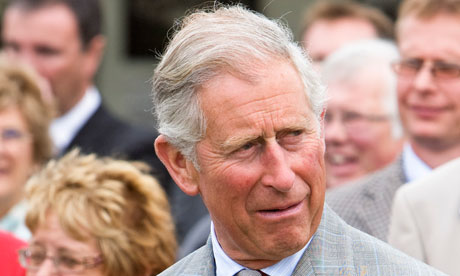We are constantly told that the monarchy has no more power in the modern world. Those aware realize that their money and influence never completely waned. The Queen still has the power through her Governor General to dissolve the parliamentary governments of many of Common Wealth nations along various other reserve powers the monarchy still holds over her kingdoms. Here is some light being shed on a veto power which the Prince of Wales still holds over legislation in Britain.
Prince of Wales: a private individual's effective veto over public legislation
'The meddling prince' and officials from his £700m private estate have scrutinised a dozen bills on their way through parliament

Prince Charles is routinely asked to give his consent to pieces of new legislation in what is effectively a power of veto. Photograph: Murdo Macleod for the Guardian
From the London Olympics and gambling to children's rights and shipwrecks, the list of draft bills scrutinised by the Prince of Wales and his officials reads like the busiest Whitehall portfolio imaginable.
The 62-year-old prince isn't a minister, an MP or even a lord; in constitutional terms, he is a subject of the crown like any other. But it has emerged that he has a far more formal role in shaping our laws than many people – legislators and civil servants included – ever knew.
Prince Charles is routinely asked to give his consent to pieces of new legislation in what is effectively a power of veto. Since 2005, ministers from six departments have sought his approval for a dozen bills.
With 650 MPs and 826 lords already raking through the fine print of legislation on behalf of British citizens, the puzzle is: why does the prince have this power and how is he using it?
Is it, as one former government lawyer has described it, the "nuclear button" that gives meaning to the prince's already controversial lobbying of ministers on his pet interests, both directly and through his network of charities? And why is it shrouded in secrecy and lacking accountability?
Lord Berkeley, an Old Etonian Labour peer, is one of those seeking answers.
Berkeley is also harbour commissioner at the port of Fowey in Cornwall and he ran up against the prince's powers last month when he sponsored a private members' bill on marine navigation. On 6 September, a blunt letter from a clerk in the House of Lords bill office arrived on his desk.
"Dear Lord Berkeley," it began. "The marine navigation bill that you introduced on 5 July would affect the Prince of Wales' interests and so will require the Prince of Wales' consent for its consideration by parliament … The government whips office in the Lords and the parliamentary branch of the Department of Transport are aware of what is required." Berkeley was told it was a matter of "if" not when the prince would grant consent.
"It was extremely vague about why [it affected the prince's interests]," Berkeley recalled. "It will be one of those things which nobody here [in the Lords] will want to rock the boat about, but I think it is worth rocking. He shouldn't be able to do this. I basically think it has nothing to do with him."
Downing Street officials say part of the reason the prince has the right to consent is because, through his position as the Prince of Wales, he is the beneficiary of the Duchy of Cornwall – a private landholding set up as a kind of trust fund for the son of Edward III, known as "the Black Prince" who became Prince of Wales in 1343. The crown has an interest in the duchy, which funds Charles's multi-millionaire lifestyle, and in the same way that legislation that affects the crown's interest must receive the Queen's consent, bills that affect the Duchy of Cornwall's interests must be agreed by the prince, who is also the Duke of Cornwall.
Where a bill affects the "hereditary revenues, personal property or other interests" of the Duchy of Cornwall, then "the consent of … the Prince of Wales must be signified in both houses [of parliament] before the bill is passed," Cabinet Office guidance states.
A minister's private secretary must write to the prince's private secretary, enclosing two copies of the draft bill, to "explain the purpose of the bill and how it would affect the crown, and asking for consent". Copies should be send to the secretary of the Crown Estate Commissioners and Farrer & Co, a legal firm that advises the crown, "who will advise the secretary of the Duchy of Cornwall of the nature of the legislation and the potential impact it may have on Duchy operations and\or privileges".
Convoluted perhaps, but the effect is clear: in 2011 a private individual enjoys a veto on public legislation because he is responsible for, and enjoys the benefit of, a huge private estate.
The Duchy of Cornwall is no sleepy backwater unaffected by changes to legislation. It is a target-oriented investment portfolio, headed by the prince with a £200,000-a-year chief executive, Bertie Ross, who oversees the equivalent of 91 full-time staff. While investors everywhere have been buffeted by financial turmoil in recent years, the value of the Duchy portfolio has risen from £618m in 2006-7, to £712m in 2010-11. The prince's annual income from the duchy has risen over the same period from £15.2m to £17.8m.
Its biggest housing development is Poundbury, a mock-Georgian new town in Dorset, but it also owns substantial commercial properties such as the Franklin Wilkins building leased to Kings College London, more than 2,000 hectares of woodland, holiday cottages in Cornwall, and the Oval cricket ground also in London. It even owns the freehold of most of the land of the Isles of Scilly and a third of the residential buildings in the archipelago.
But the duchy's business practices have not always been popular. Duchy tenants in the village of Newton St Loe, outside Bath, this year complained to the prince that they had been "fobbed off", "patronised", "misled" and "dealt with in an overly aggressive manner" by duchy representatives who handled their complaints about its plans to build 2,000 homes on neighbouring farmland. Some were afraid to speak their minds for fear of finding the terms of their tenancies changed.
It is this organisation that is the key to the prince's power of consent and ultimately veto. But attempts to gain access to official papers detailing its application have largely failed, with most government departments and ministers questioned reserving the right to keep communications with the royals private.
Fragments have emerged. In September 2008, the Department for Business Innovation and Skills consulted the prince on the apprenticeship, skills, children and learning bill. An email released under the Freedom of Information Act from a legal adviser at the department to an official at the Ministry of Justice was titled: "Apprenticeships bill: application to the royal household and the Duchy of Cornwall". The officials were concerned to know whether the royals, as employers, were happy with the creation of a statutory basis for apprenticeships.
Adam Tomkins, professor of constitutional law at Glasgow University, said it would be right for ministers to consult the prince on legislation that directly affected the duchy in a peculiar way, such as proposed alterations to its unique tax status. But he could not understand why the duchy was being granted the right to consent or dissent over issues such as apprenticeships.
"Thousands of other organisations are also employers, but they are not asked to clear legislation that affects them," he said, adding that it was difficult to see where Charles' interests lie in some of the matters on which he is being consulted.
"This builds on allegations that Charles is a meddling prince and is yet another example of how the government willfully kowtows and defers to this individual," he said. "Yet again it raises the informed suspicion that this is a prince who is seeking to maximise his influence over government policy."
Andrew George, the Liberal Democrat MP for St Ives in Cornwall, has pressed ministers to illuminate the process of Charles' consent, without success. When asked about the consultation with the duchy on the children's rights bill, the education minister, Sarah Teather, confirmed it had happened, but said: "We do not disclose the contents of correspondence with members of the royal family." When George asked if the duchy made any amendments to the Coroners and Justice Act, justice minister Crispin Blunt repeated the line.
The Office of the Parliamentary Counsel, which oversees the drafting of legislation, has refused to publish internal guidance on how Whitehall determines whether the prince and the Duchy of Cornwall should be granted the right to consent to new legislation. It said the guidance was a matter of "legal professional privilege".
http://www.guardian.co.uk/uk/2011/oct/30/prince-of-wales-veto-legislation
This entry was posted
on Monday, October 31
at Monday, October 31, 2011
. You can follow any responses to this entry through the
comments feed
.

